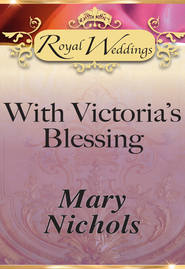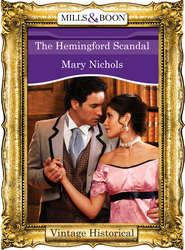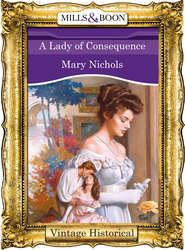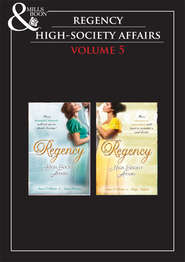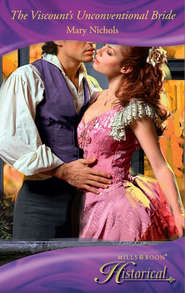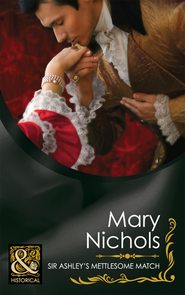По всем вопросам обращайтесь на: info@litportal.ru
(©) 2003-2024.
✖
A Desirable Husband
Настройки чтения
Размер шрифта
Высота строк
Поля
‘Oh, very well. I suppose it cannot do any harm.’ She used her fan to lean forward and tap the coachman on his back. ‘Croxon, take us round by the Mansion House.’
Without giving a flicker of reaction to this strange way of getting from Russell Square to Kensington, he obediently turned the carriage and headed down Kingsway to Aldwych, Fleet Street and Ludgate Hill, an area new to Esme. This was the financial heart of the City and was a mixture of imposing buildings and little alleyways and courts. They began to notice the crowds as they approached St Paul’s and from then it was difficult for the coach to proceed. ‘There’s nothing for it—but we shall have to get out and walk,’ Esme said when the carriage finally came to a stop, closed in by the hordes, and, before her astonished sister could stop her, had opened the door and jumped to the ground. Rosemary felt obliged to follow.
They pressed forward until they managed to find themselves a good position where they could see the guests arriving, with Rosemary grumbling all the way. ‘We’ll be trampled to death,’ she said, holding tight on to Esme’s arm.
‘Of course we won’t. You saw how everyone made way for us, they probably think we are guests.’
‘I don’t think there are any lady guests. They will all be men.’
‘Really? Then we shan’t see any sumptuous dresses.’
‘No, did you think we would?’
Esme did not answer because the police were forcing everyone back to make way for the cabs and carriages bringing the guests. There may not have been any ladies, but the men were got up like peacocks. There were foreign ambassadors in court dress, high-ranking military men in dress uniform, glittering with medals, mayors from provincial towns in red robes and regalia, bishops in their vestments, others in colourful livery, who Rosie told her were the Masters of the City Guilds, and there were men in plain evening dress, wearing honours on their breasts.
‘Oh, look, there’s Myles,’ Esme said, pointing. ‘Doesn’t he look grand?’
Myles was wearing a double-breasted black evening coat, narrow black trousers, a blue brocade waistcoat and a shiny top hat. He did not appear to see them as he walked into the building beside the Mayor of Leicester.
But someone else did notice them. The young man they had seen in the park was right behind Myles. His evening coat sported several decorations. His waistcoat was black with silver embroidery, which glittered as he moved. And he moved gracefully, Esme noticed, a sight which set her heart pumping. Oh, but he was handsome! He turned to follow Myles and caught sight of her animated face under a fetching blue bonnet and, smiling, stopped to doff his hat and give her a slight bow of recognition before disappearing inside.
‘The effrontery of the man!’ Rosemary exclaimed. ‘You should not have encouraged him to be familiar, Esme.’
‘I didn’t encourage him. I cannot help it if he chooses to tip his hat to me. I do not know why you are making such a fuss.’
‘It is the second time today. I begin to wonder if you do know him after all and that is why you wanted to come here.’
‘No, Rosie, I promise you I have never met him. It is pure coincidence.’
‘If you ever meet him again, I want you to cut him dead. I cannot have him think you wish to know him.’
Esme did not answer, though she could have told her sister she would not mind knowing him. He must be someone of importance if he had been invited to the banquet. Instead she turned back to the road in front of them as a crescendo of cheering signified that Prince Albert was arriving. Dressed, according to Rosemary, as an Elder Brother of Trinity House, he was met at the door by the Lord Mayor of London in full regalia, as soon as they had gone inside, the doors were closed.
‘There’s nothing more to see,’ Rosemary said. ‘We might as well find the carriage and go home.’
It was easier said than done; the crowd seemed reluctant to disperse and were still milling about talking of what they had seen and those guests they had recognised. Rosemary and Esme linked arms and pushed their way through. By the time they reached the carriage, Rosemary’s bonnet was awry and she was decidedly nervous, unlike Esme who did not realise the dangers inherent for two women walking about the city streets alone after dark, for night had fallen while they had been standing and it was now nearly seven o’clock.
‘Thank heaven for that,’ Rosemary said, when they had gained the safety of the carriage and she was able to set her hat straight. ‘Don’t ever inveigle me into doing anything like it again, Esme, for I declare I’m done in.’
‘Oh, but I shall have such a tale to tell Mama and Papa when I write.’
‘No, Esme, I beg you not to. They will think I do not know how to look after you and Papa will come and fetch you back and you will have no come-out. It will make me look an idiot to my friends and all those people who have invited you to their homes. You wouldn’t want that to happen, would you?’
Esme agreed that she wouldn’t. After all, there was a handsome young man in town whom she seemed destined to run into and who was she to argue with destiny? She could not help wondering about him. He was very self-assured, perhaps a little conceited, but he had every right to be, considering how handsome he was. She wondered how many young ladies were falling over themselves to be noticed by him. If he was still around when the new débutantes were released on to the town, he would be seized upon by every hostess and hopeful mama and bombarded with invitations. Unless, of course, there was something unacceptable about him—a shady past, some scandal, or perhaps he was not as financially independent as he appeared. Oh, she did hope that was not the case.
Chapter Two
Felix followed the procession of guests down the corridor, lined with greenery, to the Egyptian Hall where the banquet was being held. In honour of the occasion, the columns round its walls were decorated with symbols to represent the different British counties and their products. At the head of the table were two figures representing peace and plenty and at the other Britannia holding a plan of the Exhibition, which could only have been the committee’s own plan, surrounded by four angels delivering invitations to all the countries in the world to send exhibits. ‘What do you think of that?’ he murmured to the man beside him, nodding at Britannia.
‘The statue?’
‘No, the plan of the building in her hand.’
‘I think we could do better.’
‘I am sure we can.’ He held out his hand. ‘Felix Pendlebury.’
‘How do you do?’ Myles took the hand and shook it. ‘Myles Moorcroft.’
‘Oh, I’ve heard of you. A railway entrepreneur, aren’t you?’
‘Among other things. I have heard your name somewhere, too. Lord Pendlebury, if I’m not mistaken. Something to do with the manufacture of glass.’
‘Among other things,’ he said, echoing Myles’s own words.
‘You intend to submit an exhibit?’
‘More than that—I’m going to have a go at designing the Exhibition hall. It needs to be light and airy, something to make people want to come to visit, not a mausoleum.’
Myles laughed. ‘Glass?’
‘Well, why not?’
‘No reason at all, if it can be made safe.’
‘I think it can. Glass is much tougher nowadays than it used to be.’
They stopped speaking as Prince Albert arrived and took his seat. ‘Have you met His Highness?’ Myles ventured.
‘Yes, we both belong to the Society of Arts, which is how I came to be involved with the idea of the Exhibition. What about you?’
‘I met him through the Society to Improve the Condition of the Working Classes. We are both passionate about that.’
‘Ah, now I place you. You’re the gentleman who calls himself a navvy. I heard tell of a wager about filling a truck with forty tons of earth in a day. Is it true? Did you do it?’
‘Yes, though that was some time ago. Nowadays I only go on site to inspect the works and make sure the men are content. A contented workforce works better than one that is constantly bickering.’
‘Then we are in agreement. What is your interest in the Exhibition?’
‘Apart from raising funds, I might be interested in supplying the builders with girders and other metal products from my engineering works in Peterborough. And I would like to exhibit a locomotive.’
‘A locomotive! How would you bring it to the site?’
‘Ah, that’s the challenge.’
Felix laughed and they continued to talk animatedly through all the courses—turbot soup, fish, lobster, game pies, pigeon and mutton, fruit cakes and ices—and only stopped when the traditional loving cup was passed round the whole company. After that the loyal toast was drunk and the National Anthem sung before the speeches. First to speak was Prince Albert, who outlined the reasons for having an exhibition and was vigorously applauded when he said it should be paid for by public donation and not government funds. ‘Which is the reason we are all here,’ Felix murmured.
The Prince was followed by several more, all echoing the same theme. Sir Robert Peel, an elder statesman and former Prime Minster, said he was confident they would succeed in spite of the objections of some, a pointed reference to people like Rowan. The Earl of Carlisle was the last speaker and he said the Exhibition should encompass all nations, classes and creeds, saying it was predominantly intended as a festival of the working man and woman.






